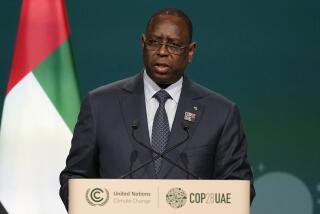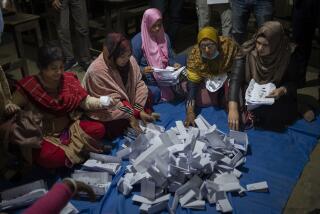Sudan vote in turmoil amid opposition boycott
- Share via
Reporting from Cairo and Khartoum, Sudan — Political uncertainty and the prospect of renewed violence intensified in Sudan on Thursday when the main opposition groups vowed a partial boycott of national elections over allegations of fraud against the ruling party of President Omar Hassan Ahmed Bashir.
The decision undercuts the legitimacy of April 11 elections that have been heralded as the African nation’s first credible multi-party contest in 24 years. International monitors have warned of corruption, and the refusal by opposition groups, especially the leading Sudan People’s Liberation Movement, to field presidential candidates has further threatened to splinter the war-torn country.
The elections are a precursor to a 2011 referendum that will decide whether the largely Christian and animist south, led by the SPLM, will break away from the predominantly Muslim north. The voting, however, is expected to have little influence in ending the bloodshed in the Darfur region, where war between rebels and government-backed militias has left an estimated 300,000 people dead in recent years.
The prospects for a fair and widely endorsed poll began unraveling Wednesday night when Yasir Arman, the SPLM presidential candidate, withdrew after complaining of the fighting in Darfur and accusing the government of controlling the media and rigging the electoral process. Other key opposition parties decided to follow suit.
The ruling National Congress Party said the election would proceed.
Opposition figure Mariam Alsadig, deputy director of the Umma Party, said: “We are boycotting the elections because the National Election Commission is with the ruling party and the government in committing fraud. We will reconsider our decision if our demands are met and free and fair elections can be assured.”
U.S. special envoy Scott Gration held emergency talks Thursday with government and opposition leaders. An earlier joint statement by the United States, Britain and Norway said the countries were “deeply concerned by reports of continued administrative and logistical [electoral] challenges, as well as restrictions on political freedoms.”
The SPLM and other groups said they expect to field candidates in simultaneous regional and parliamentary elections, except in Darfur and some northern areas. The SPLM’s larger aim is to build momentum for next year’s referendum, part of the 2005 peace accord between the Bashir government in Khartoum and southern rebels. Human rights groups fear fresh violence as weapons flow into the south, home to most of the country’s oil reserves, in the event Bashir rejects the independence vote.
Arman’s decision removes Bashir’s strongest competitor. Some analysts suggested a deal had been struck between the National Congress Party and the SPLM to clear the way for Bashir in exchange for the government withdrawing its candidate in the south’s regional election and for no interference from Khartoum in the referendum.
Election monitors, such as the Carter Center founded by former President Carter, have requested a brief delay in the vote. Luis Moreno-Ocampo, prosecutor for the International Criminal Court in The Hague, which has indicted Bashir on war crimes charges over the Darfur conflict, said overseeing the poll would be comparable to “monitoring a Hitler election.”
The tone was set when Bashir earlier chastised international organizations. “We brought these organizations from outside to monitor the elections, but if they ask for them to be delayed, we will throw them out,” he said. “We wanted them to see the free and fair elections, but if they interfere in our affairs, we will cut their fingers off, put them under our shoes and throw them out.”
John Lemi, a political analyst, said: “This is a very good time for them [the government] to win. If they’re reelected, they will have immunity. They are wanted for criminal charges, so they want elections as fast as they can to gain immunity.”
jeffrey.fleishman @latimes.com
Ahmed is a special correspondent.
More to Read
Sign up for Essential California
The most important California stories and recommendations in your inbox every morning.
You may occasionally receive promotional content from the Los Angeles Times.














